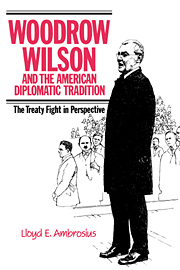Book contents
- Frontmatter
- Contents
- Preface
- Acknowledgments
- List of abbreviations
- 1 Introduction: Wilson's new world
- 2 Origins of Wilson's league of nations idea
- 3 Drafting of the League of Nations Covenant
- 4 American criticism of Wilson's peacemaking
- 5 Revision of the League of Nations Covenant
- 6 The question of control at home and abroad
- 7 The Versailles Treaty in the Senate
- 8 American rejection of the Versailles peace
- 9 The aftermath of Wilson's peacemaking
- 10 Epilogue: Wilson's legacy
- Bibliography
- Index
10 - Epilogue: Wilson's legacy
Published online by Cambridge University Press: 18 September 2009
- Frontmatter
- Contents
- Preface
- Acknowledgments
- List of abbreviations
- 1 Introduction: Wilson's new world
- 2 Origins of Wilson's league of nations idea
- 3 Drafting of the League of Nations Covenant
- 4 American criticism of Wilson's peacemaking
- 5 Revision of the League of Nations Covenant
- 6 The question of control at home and abroad
- 7 The Versailles Treaty in the Senate
- 8 American rejection of the Versailles peace
- 9 The aftermath of Wilson's peacemaking
- 10 Epilogue: Wilson's legacy
- Bibliography
- Index
Summary
Wilson's failure in the treaty fight left the United States without clear direction for its foreign policy. But those who shared his conception of internationalism overlooked the fact that the same problem would have confronted this nation even if he had succeeded. The League of Nations offered, at best, a framework for international relations; it did not provide answers to the difficult questions facing the great powers after the World War. The Covenant, under Articles 10 and 19, authorized the potentially contradictory alternatives of either enforcing or revising the Versailles Treaty. The choice remained open in Wilson's League. Rather than decide in 1919 whether to seek peace through collective sanctions or appeasement, the president wanted to retain both options for the future. The Covenant thus embodied his paradoxical idea of “progressive order” through international social control.
Wilson expected the new League to resolve the fundamental dilemma confronting the United States in the modern world. It would, he hoped, serve as an instrument of American control over foreign affairs, but without endangering national independence. It would allow the United States to provide global leadership without entangling itself in the Old World's diplomacy and wars. It would, in short, permit universal and unilateral tendencies to coexist harmoniously in American foreign relations. But pluralism, which prevented Wilson from achieving universal acceptance of his ideals and practices at Paris, continued to thwart fulfillment of his vision during the postwar years. At the same time, interdependence among nations precluded the United States from maintaining its traditional isolation from the Old World. This combination of pluralism and interdependence created the basic problems for the United States, and also for the League.
- Type
- Chapter
- Information
- Woodrow Wilson and the American Diplomatic TraditionThe Treaty Fight in Perspective, pp. 290 - 298Publisher: Cambridge University PressPrint publication year: 1987



